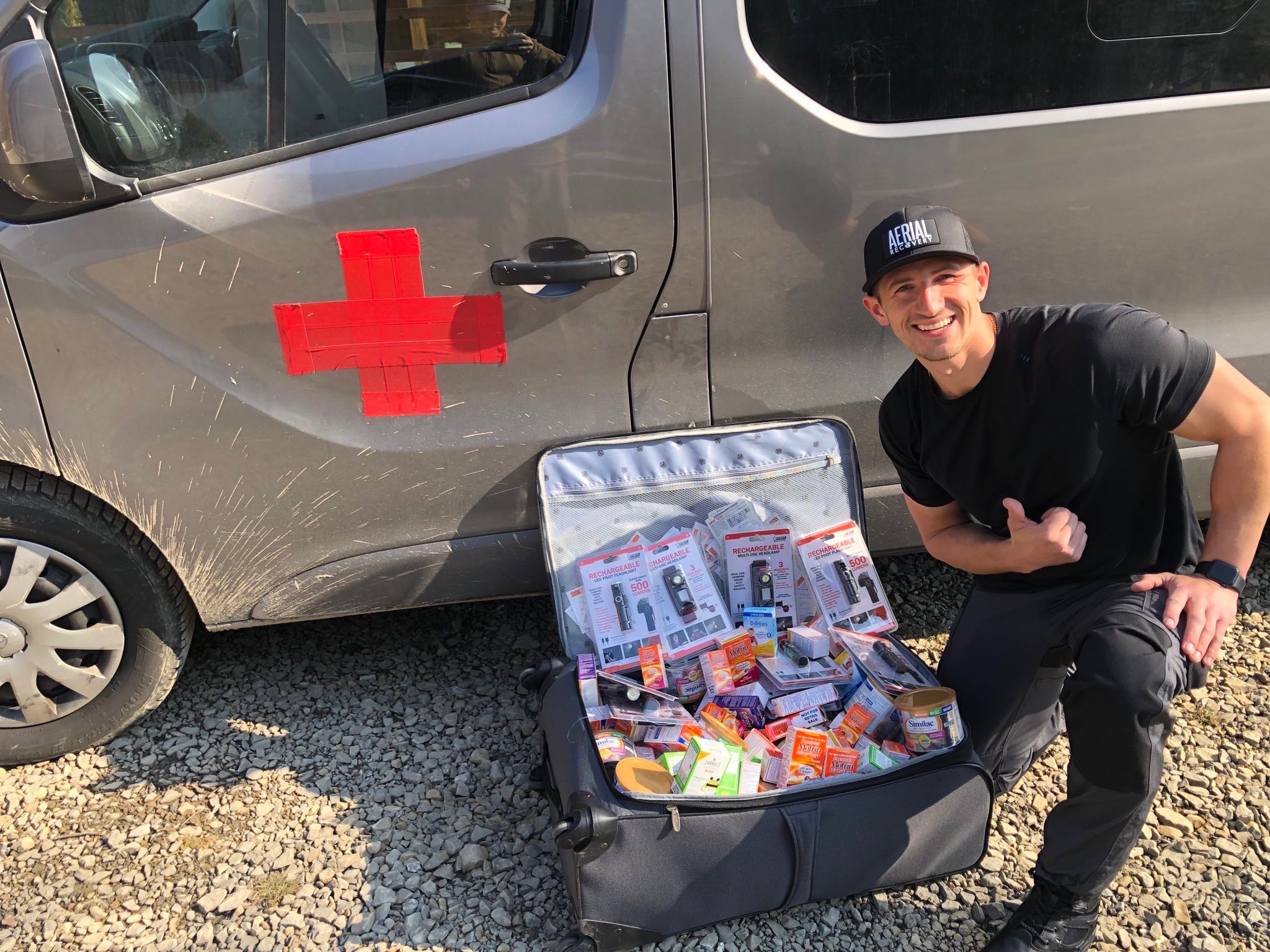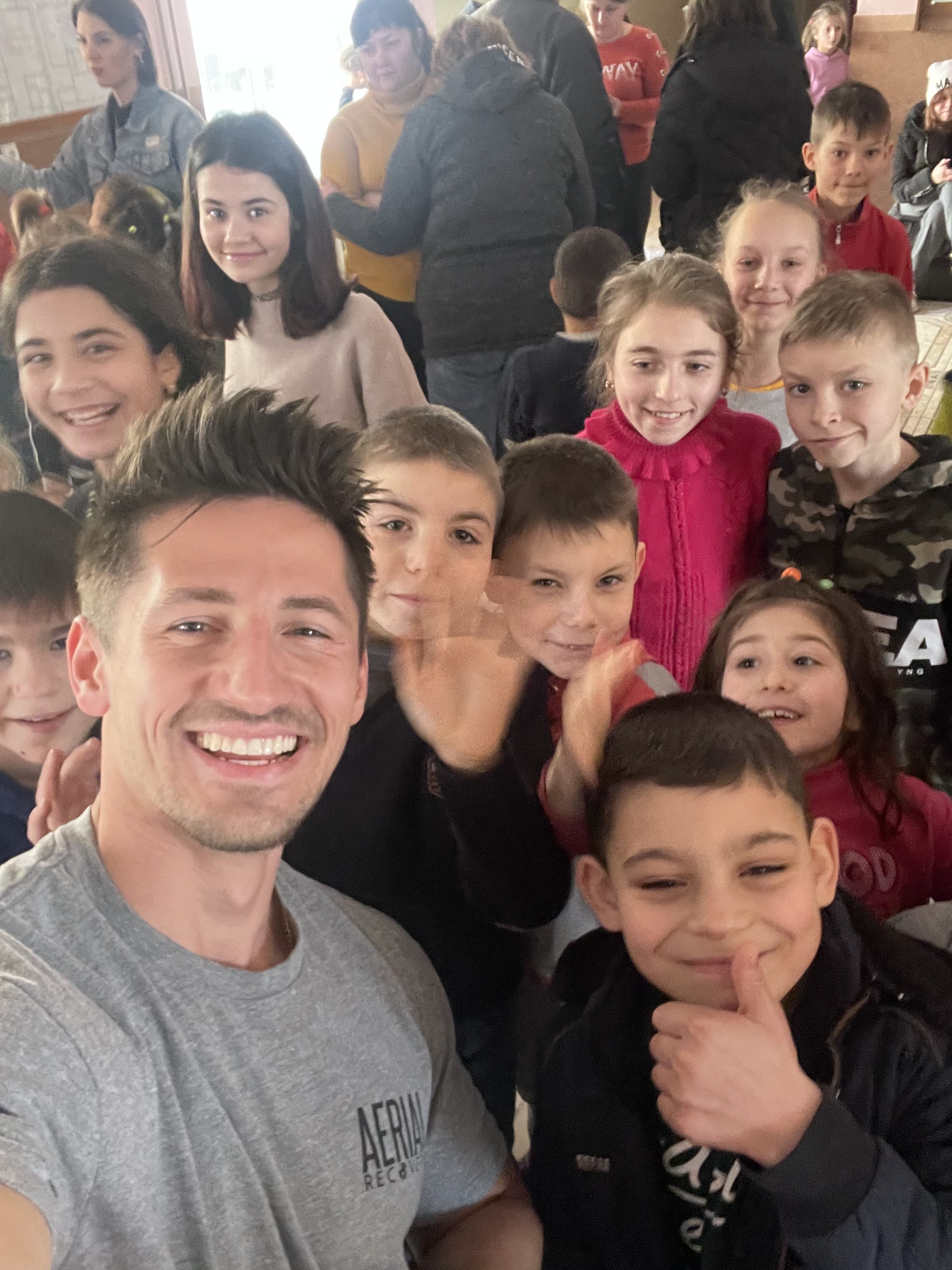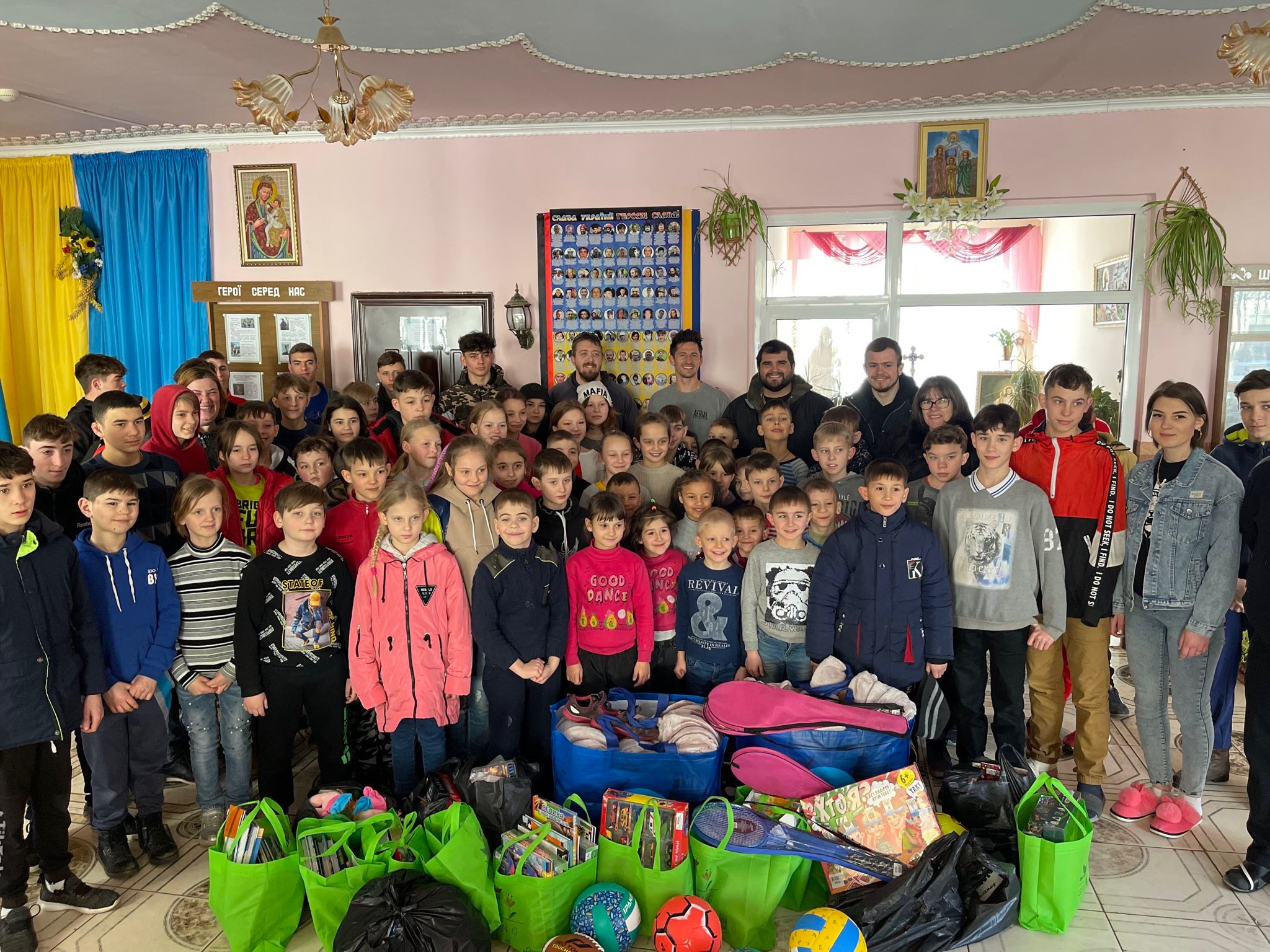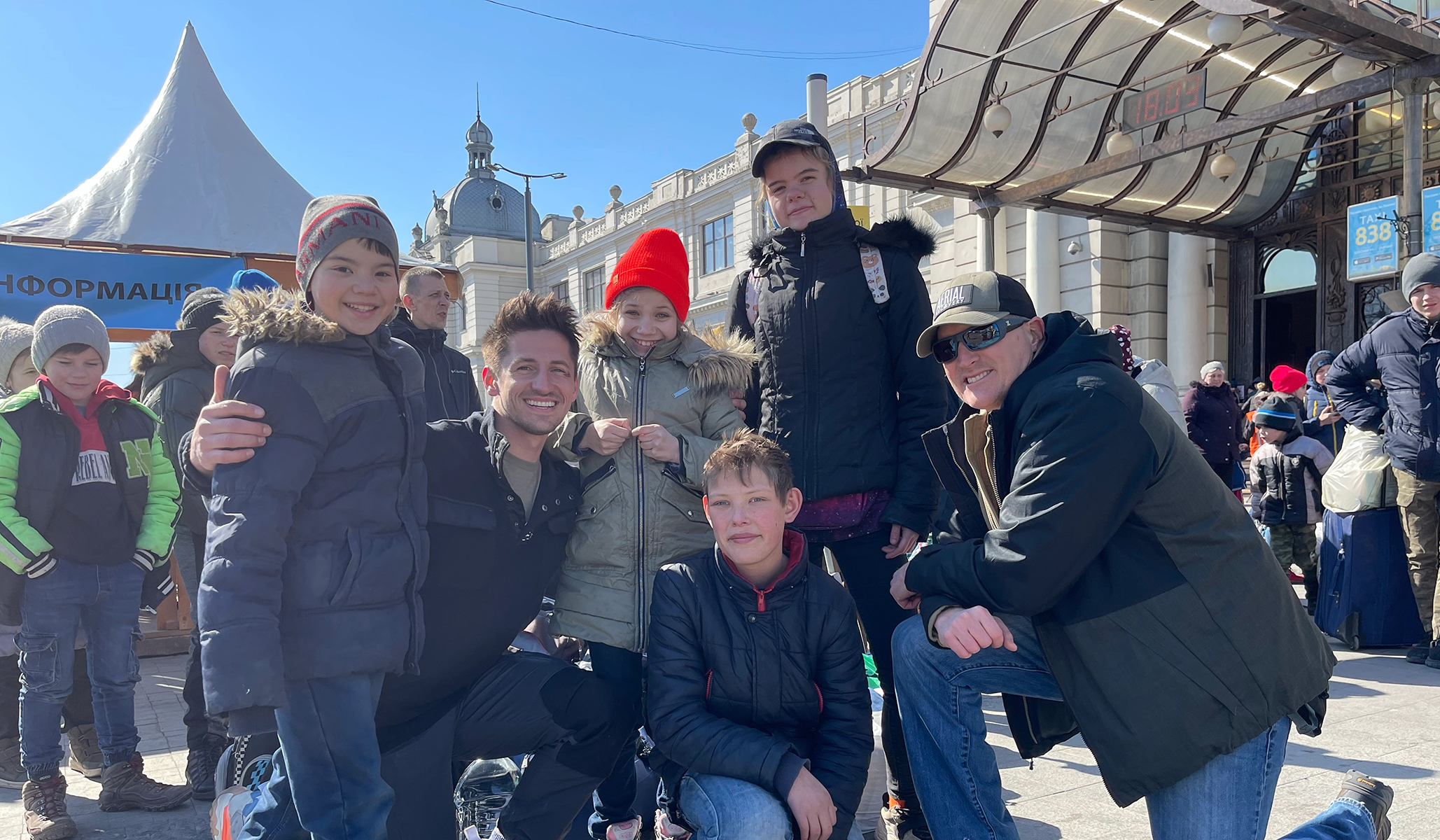Breaking: Former Ukrainian Orphan Heads Back to Help Rescue Others from Russian Invasion
- Obtenir le lien
- Autres applications
Vlad Finn arrived in Poland last month with a backpack, a suitcase full of supplies, and no plan.
The 29-year-old fitness trainer from Los Angeles figured he could find a way to the Ukrainian border and make himself useful, but he wasn't sure just how. He'd reached out to several nonprofit groups that had started working in Ukraine soon after the Russian invasion, offering his services; some passed, some equivocated, some didn't reply at all.
Finn said he took no offense. It was a crazy time, the nonprofits were still getting organized, and he had no military experience to offer. But as a former Ukrainian orphan who still has some friends and former caretakers in the country, he felt an overwhelming urge to be of service.
"You feel so helpless being in L.A.," said Finn, who donated money to aid the Ukrainians early in the conflict but wanted to do more. "As time went on, I was like, I need to go there. I can't keep going about my life while seeing a lot of my friends and my country suffering."

Soon after he arrived in Kraków in mid March, as he was preparing to catch a bus to the border, Finn received a call from a leader with the Aerial Recovery Group, one of the dozens of American nongovernmental organizations (NGOs) now operating in Ukraine. The Tennessee-based nonprofit has been rescuing Ukrainian orphans from the war zone, and it's one of the first groups Finn reached out to. They were in Warsaw, but heading to Ukraine, Finn was told. They'd be there in a few hours if he still wanted to join them. "It happened so fast," he said.
Over the past seven weeks, the Aerial Recovery Group has extracted nearly 700 orphans and another 300 to 400 refugees from eastern Ukraine, often from deep in Russian-held territory, Jeremy Locke, the organization's chief of operations, told National Review. The group is working as a partner with Ukrainian military administrators and the country's child protective services to ensure that the children they rescue are moved legally, and that they are safe and accounted for throughout the process.
Once the kids are extracted, they're taken to one of 32 safe-haven shelters in western Ukraine, where volunteers like Finn make sure they have everything they need — food, clothing, a place to sleep, someone to kick a soccer ball around with.
"Their journey has just started when we get them out of those dangerous areas," Locke said.
Finn said volunteering with the Aerial Recovery Group has been a great fit, considering his history as an orphan in eastern Ukraine.
"I was getting goose bumps," he said. "It's almost like going back in time in a way."

'I Got Very Lucky'
Finn was born and raised in Kharkiv, and his path to the orphanage was a slow one. He was six when his father died, and his mother, who already struggled with alcohol, began drinking heavily. He said his mom stopped caring for him and his younger brother, Denis. By the time he was nine, Finn was sleeping in parks and subway stations.
He ended up in an orphanage at 11, he said. "Luckily, I ended up in this really lovely orphanage that was religious, and the people were amazing there," he said.
His brother was in a different orphanage nearby, and they saw each other occasionally. A couple of years later, Finn's brother visited the U.S. with his orphanage, and a couple from New York decided to adopt him. "In the process, they found out about me," Finn said.
Because of his age — Finn was 15 by the time he was adopted — the couple who would become his parents were initially hesitant about adopting him. But Finn said his dad is a retired New York police detective, so the family figured he could handle Finn if he was trouble.
Finn played high school and college soccer, and he studied finance. Looking for a career that was less office-oriented, he decided to become a personal trainer and moved to California.
"I got very lucky, because people would just extend their hand to me throughout my life, and as a result, it worked out the way it did," Finn said. It was this appreciation for the people who'd helped him, and his understanding of the difficulties Ukrainian orphans face, that drove Finn's desire to pay it forward after the Russian invasion, he said.
When Russian soldiers began massing at the Ukrainian border in February, it was clear to Finn that they would attack. Even knowing that, he said, it still felt "surreal" when it happened. "I was almost like, numb," Finn said, calling the invasion a "nightmare."
In early March, he said, he decided to head to Poland to serve however he could. He didn't have military experience, but the former street kid knew the language and knew Ukraine, so he figured he could help somehow. A friend and client put together a large bag of supplies — children's medicine, flashlights — that he brought with him on his first trip.
"I didn't really have a solid plan, except bringing supplies," he said.
After hooking up with the Aerial Recovery Group, the group's leaders said he could stay in Poland and help them there, or he could go with them into Ukraine. "After meeting them . . . I was like, 'I'm coming for sure,'" Finn said. "They also are such badasses."
Natural and Man-Made Disaster Responders
Aerial Recovery Group was launched about five years ago as an organization that deploys humanitarian operators — mostly veterans with special-operations backgrounds — to natural and man-made disasters around the world, said Locke, a retired Green Beret.
Their first big response was in 2019, after Category 5 Hurricane Dorian walloped the Bahamas. They've since responded after hurricanes, tornadoes, volcanic eruptions, and earthquakes. After the Biden administration's botched withdrawal from Afghanistan last August, Aerial Recovery Group volunteers helped get 250 refugees across the border into Tajikistan, Locke said.
Ahead of the Russian invasion, Aerial Recovery Group leaders started getting emails and social-media messages from humanitarian groups from countries in central and southeast Europe looking for help extracting orphans from Ukraine. There were tens of thousands of orphans in Ukraine before the war, and maybe more than 100,000, according to estimates.
Locke said there was mass chaos after the invasion, with groups coming in, putting orphan children on buses and heading to the borders. He said some people were handing kids off to people they met online who claimed to be representatives of child-aid organizations without a clear understanding of who those people were or where the kids were going.
"What we very quickly found out was there was around 10,000 orphans unaccounted for," Locke said, expressing concern that some children could have been taken by human traffickers.
After entering Ukraine in late February, Aerial Recovery Group leaders made contact with government officials, who confirmed they needed help rescuing endangered children from the country’s hundreds of orphanages, Locke said. On the Aerial Recovery Group's first mission in Ukraine, they rescued five orphans east of Kyiv, beyond the Ukrainian lines. "At one point we were like four clicks from a forward armored element of Russian army," he said.
The Aerial Recovery Group has a memorandum of understanding with the Ukraine military administration and child services in Lviv in western Ukraine to partner with them in rescuing orphan children and other refugees. They're in the process of signing a national memorandum of understanding, Locke said. He said his organization has about ten members in Ukraine and has developed a network of about 80 people, mostly Ukrainians.
"It's crazy how much we've grown in the last six weeks," Locke said. "It's a miracle."

Targeting Humanitarians, Targeting Kids
The trips to rescue children in eastern Ukraine can be treacherous. Locke said they have "quality reports" that Russian soldiers are targeting humanitarian volunteers and medical workers. They've stopped putting red crosses on their vehicles for protection.
In at least two cases, caregivers were killed by Russians during rescue operations, Locke said. In one case, he said, the kids they were rescuing had to be taken off a bus and sheltered because of heavy Russian shelling. Two of the four caregivers were gunned down when they left the shelter to get provisions. In another case, Russian soldiers executed two caregivers at a checkpoint. The bus driver drove through the checkpoint, slamming on the gas to get the children to safety. Locke called the Russian tactics "savage and evil."
"They are actively targeting humanitarian workers, which is what we are, and they are actively targeting these caretakers and these kids," he said.
Tyler Merritt, a former special-operations helicopter pilot who has volunteered as a driver with the Aerial Recovery Group and another NGO, Save Our Allies, said Russian soldiers are intentionally shooting into vans with women and children, and targeting news reporters.
"I've definitely seen evil, and I've seen the most atrocious things done to another human being," Merritt said of his experience in other war zones. "But there has always been that general understanding, women and kids are off limits, orphans are off limits."
Locke said the Aerial Recovery Group uses a variety of methods and vehicles in their operations. In some cases, he said, they'll take buses into safe areas and fan out from there in smaller, more maneuverable vehicles. They also vary their methods, changing up movements and rescue times, switching out vehicles, to avoid detection.
"The trick is just blending in," he said. "We just don't want to look different than anybody else."
Locke said it is possible to get through Russian checkpoints as long as the rescuers are Ukrainians from the region and driving vehicles registered for the area.
"If you're deceptive to them, if you have a weapon in your vehicle, or if you just catch the wrong guard on the wrong day, they'll literally take you out of your vehicle and confiscate it and execute you on the side of the road," he said. "It's super dangerous."
Locke said the war is taking a visible toll on the children he's encountering.
"I see the looks on their faces, like shell-shocked soldiers," he said. "War steals your innocence. And these are little kids, and kids are made up of innocence."
Serendipity in the Chaos
Merritt is critical of the Biden administration's response in Ukraine. Without a more decisive response from the U.S. government, he said, "it's going to be NGOs that are stopping World War III." He's been helping to gather supplies — tourniquets, individual first-aid kits, body armor — to help the volunteer groups operating in Ukraine. He's also raising money through his Nine Line Foundation, and through his Nine Line Apparel company, which sells patriotic-themed clothing.
"It's an incredible group of volunteers that are doing it not for the glory or fame," Merritt said of the Aerial Recovery Group.
Locke said their rescue efforts cost about $500 per orphan, and what they need most at the moment are cash donations to keep their operations going.
"[Putin] did not expect that NGOs around the world would unite to ensure that supply chains and medical treatment and other things were provided to (the Ukrainians)," Merritt said.
Finn, he said, is an example of "what happens when you take care of your Ukrainian orphans."
"They come to the United States,” he said, “they earn scholarships, and then they go back and help defend against oppression and a new type of evil that hasn't been seen since (expletive) Hitler."
Finn spent a couple of weeks volunteering with the Aerial Recovery Group before he had to return to L.A. to work, so he could do it all over again. He's since returned to Ukraine for another shift.
"My plan is to keep doing it as long as I can, I guess, as long as it's needed," he said.
Finn said it is "heartbreaking" to see what's happening in his former country. People are dying, losing their homes, and losing everything they've worked for in their lives. The orphans he's working with often have all their belongings stuffed into tiny backpacks.
But at the same time, he said, there is a sense of serendipity in the chaos.
"It's weird to say it almost, but it's super motivating," Finn said of his work with Ukrainians. "Being amongst them, everyone is working to help out others who are more in need than them. Which is hard to imagine, because they don't have anything left."
| |
| THIS BREAKING NEWS ITEM IS PRESENTED BY  |
| |
|

- Obtenir le lien
- Autres applications



Commentaires
Enregistrer un commentaire
Thank you to leave a comment on my site